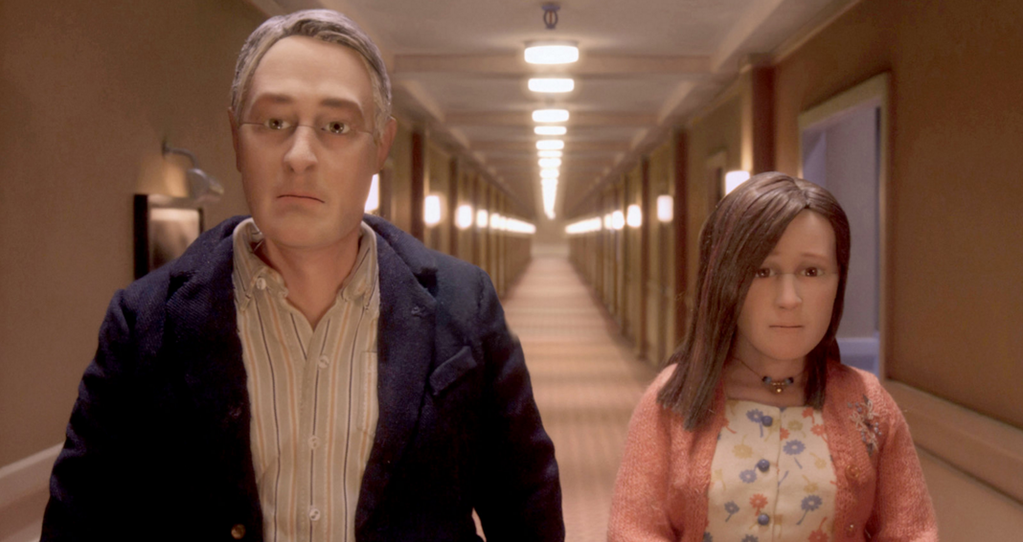ANOMALISA Review
Director: Charlie Kaufman
Genre: Dramedy
Release: 2015
Charlie Kaufman is most likely not “all there.” Dealing with his demons by telling surrealist stories of vision-oriented egoists (Hell, 2002’s ADAPTATION is literally all about him), he’s a creative madman that we are blessed to bask in the work and presence of. His symbol-ridden 2008 directorial debut, SYNEDOCHE, NEW YORK, often considered his magnum opus, hinted that perhaps this auteur worked best with a collaborator to keep him on a leash, to ground his concepts in a tangible reality. With SYNEDOCHE, Kaufman was able to reflect his entire warped, melancholic worldview in every frame. He had utter control over every asset of the film – well, except for one: physical movement. You can give as much detailed blocking to an actor as you want, but they will still always move by their own volition. Enter his latest, ANOMALISA, a stop-motion animated foray into self-loathing wherein Kaufman could, and did, oversee the movement of every last ligament of each of his characters. Technically, this is the closest we will ever get to entering the mind of Charlie Kaufman. And, unfortunately, the excursion is both all-too similar and underwhelming.
“The Hand of God”
Starring his most self-centered, egocentric character to date, and the crop is crowded, ANOMALISA has no grand concept at its core. There are no crawlspaces into other people’s heads, no cities built inside of warehouses, none of that. Instead, we have a lonely, married motivational speaker, Michael Stone, holed up in a hotel as he attempts to have a one-night stand. Here’s the catch: every person he meets has the same face and the same exact voice. Kaufman is presenting a disappointingly slight study of misanthropy by one-notedly depicting depression and how we can project the worst of ourselves onto others, yet, thanks to Tom Noonan’s absolutely splendid vocals, the gimmick ends up working. It’s a fantastical story of the banal with animation so painstaking and beautiful, it seems like it’s part of a greater sick joke. The figurines at the forefront of ANOMALISA are staggering creations, so real and true to life that it feels as if Kaufman pulled a Willy Wonka and discovered a new species of humanoid creatures to enlist in his workforce. This is next-level animation. And what is it used on? A man dialing the phone, talking to an ex, and pacing around the room for eight minutes. Is it a meta-textual allusion to how we put so much delicate work into what is ultimately inconsequential and petty (a.k.a. life)? Even if subversion is at play, the scope of the animation is kept regrettably restricted.
Pure anguish never looked so inventive
And about Michael Stone: what an unendurable fellow. Kaufman’s most memorable protagonists were never exactly fun to hang around with, but the hopes and delusions they were so driven by kept us hanging around for more of their ingenuity. What keeps us hooked on Stone? Another glimpse of his hilarious, floppy puppet penis. Fortunately, his one-night standee, Lisa, played perfectly by Jennifer Jason Leigh, is a layered delight, regardless of her obvious MPDG-status. The sex scene between Michael and Lisa is passionate, tender, and reaches a transcendent level of emotion and truth that the rest of the picture never gets close to capturing. It’s a scene so beautiful that it almost makes up for the preceding scene where Michael and Lisa lay on a bed talking about favorite words, explain what the word “anomaly” means, and then slowly create the nickname “Anomalisa.” Blech.
The comedy is both quietly goofy (a distant billboard for a zoo boasts that it’s “Zoo-sized!”) and blatantly sitcom-y (which button on the phone calls room service: is it the button with the hamburger or the button with the fork and knife? Wow-woo-wee-wah!), with neither quite excelling. And then there’s the matter of how ANOMALISA isn’t saying anything differently, or better, than any other one of its creator’s other works. Just when the movie is about to enter a new and much-needed frontier of weird, it pulls out almost immediately; ANOMALISA is terrified of its own possibilities. Sure, it’s hand-crafted, but Charlie Kaufman is clumsily reiterating what he’s been saying for almost two decades.
What should have been Kaufman’s truest film ends up being his most inessential.
Verdict: Do Not Recommend






